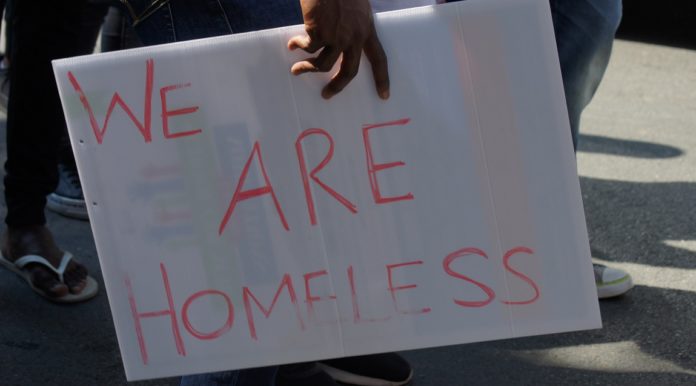Every year, the CIVICUS Monitor, a global rights index, provides an assessment of the conditions of civil society within countries. It looks at the civic space in countries and the extent to which countries are protecting fundamental rights. According to the report, People Power Under Attack 2021, South Africa has been downgraded from ‘narrowed’ to ‘obstructed’. The Daily Vox team spoke to David Kode, the advocacy and campaigns lead at CIVICUS Monitor to find out more.
Kode leads CIVICUS’s #StandAsMyWitness campaign, calling for the release of imprisoned human rights defenders around the world. He is also interested in strengthening civil society organisations in African countries.
READ MORE:
Five human rights trends in SA: Activists fight back as COVID-19 takes its toll
What is the index and what are some of the main criteria?
Kode said the CIVICUS Monitor analyses civic space. This space is defined as the respect in policy, law and practice for the freedoms of association, peaceful assembly and expression. “Over 20 organisations with research expertise from around the world joined forces on the CIVICUS Monitor with the aim to provide an evidence base for action to improve civic space,” said Kode. The country-specific updates from national civil society and where there are no partners, the monitor relies on other sources, Kode said.
Of the 54 countries on the continent, 49 countries were included in the report. Six are rated as closed, 24 as repressed and 13 as obstructed. Since the previous update, civic space ratings have deteriorated in Benin, Botswana, Mali, Mozambique and South Africa.
Kode said research partners posted a total of 568 civic space updates from November 1 2020 to October 31 2021. “For the period assessed, these civic space updates cover 156 countries and territories,” he said. Each country’s civic space is rated in one of five categories – open, narrowed, obstructed, repressed or closed.
RELATED:
In Photos: South Africa Joins Global Strike For Women
Why has South Africa been downgraded from ‘narrowed’ to ‘obstructed’?
The downgrading of South Africa is due to the use of excessive force against protesters, escalating harassment, arbitrary detention and killings of HRDs, said Kode. This use of excessive and lethal force was seen when the police shot dead Mthokozisi Ntumba, a bystander, as they dispersed a protest by students from Wits University.
RELATED:
Mthokozisi Ntumba who was killed by police at Wits protest was left alone to die
Kode said other examples included the excessive force against environmental defenders from mining communities who have held anti-mining protests. Whistle-blowers and trade union leaders risk being targeted for assassination. There were several killings such as Babita Deokaran and Malibongwe Mdazo.
RELATED:
Whistleblower Athol Williams hopes to return home one day
Journalists also face surveillance from the authorities, said Kode. News24 journalist Jeff Wicks, had his phone bugged with a phone tracking device in a bid to establish his sources. Another thing of major concern, Kode said, has been the situation for LGBTQI+ in South Africa has been deteriorating. While South Africa’s legislative framework has been hailed for its progressive nature, “LGBTQI+ campaigners and individuals live and operate in a hostile environment”. Kode said this is characterised by hate speech, death threats and killings.
RELATED:
Our progressive constitution is not enough to protect LGBTQIA+ people
What does “narrowed” mean and what does “obstructed” mean?
Kode said narrowed means the state allows individuals and civil society organisations to exercise their rights. This includes the rights to freedom of association, peaceful assembly and expression, violations of these rights also take place. People are allowed to protest and form associations, however these may be impeded by occasional harassment, arrest or assault.
Obstructed on the other hand means civic space is heavily contested by power holders. Kode said those in power can impose a combination of legal and practical constraints on the full enjoyment of fundamental rights. “Citizens can organise and assemble peacefully but they are vulnerable to frequent use of excessive force by law enforcement agencies,” Kode said.
RELATED:
“We are deeply worried about a trend to undermine the ability of citizens to organise and mobilise”
On the African continent, the other countries which are obstructed are Botswana, Burkina Faso, Comoros, Gambia, Malawi, Senegal, Sierra Leone and Zambia. From other regions, they are Brazil, Chile, Hungary, Serbia, Ukraine and the USA. Kode said these are countries where civil society exists but state authorities undermine civil society.
The press release gives two main reasons. Can you explain those and explain if there are any other reasons for the downgrading?
Kode said the reasons advanced for downgrading South Africa are the use of excessive force against protesters, increase in harassment and arbitrary detentions and killings of human rights defenders. “The downgrade now means that civic space in South Africa is heavily contested by power holders, who impose a combination of legal and practical constraints on the full enjoyment of fundamental rights,” he said.
Finally, what will South Africans and the government need to do to improve the situation?
Kode said the situation can be improved when in law and practice, South Africa respects the provisions in the Constitution. He said there is a need to apply the rule of law objectively and respect the rights of assembly and expression by all citizens. “The government needs to carry out independent investigations into all cases where protesters, whistle blowers and human rights defenders have been targeted or killed and hold perpetrators accountable for their actions,” he said.
“More broadly, the South African government has to enable and safeguard the enjoyment of civic space for all its people. The authorities need to create an environment where levels of fear are low as citizens can demonstrate in public places without restrictions in law and practice. The state needs to ensure that as a rule the police protect protesters and where in law and practice the state adheres to constitutional provisions and international law and standards.”









